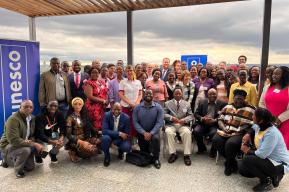News
2023 East and Southeast Asia UNEVOC Network Consolidation Workshop Held

The 2023 East and Southeast Asia UNEVOC Network Consolidation Workshop, hosted by the Korea Research Institute for Vocational Education & Training (KRIVET), took place from October 17th to 19th. The three-day event, titled "Beyond New Normal, Towards the Transition: TVET for Resilience," brought together UNEVOC Centers from the East and Southeast Asia region and an array of international vocational education and training experts.
The event marked a significant moment of reunion and knowledge exchange, given that the global community was emerging from the challenging grip of the Covid-19. It provided a unique opportunity for experts and practitioners to discuss strategies and analyze the situation in order to strengthen and enhance capacity of Technical and Vocational Education and Training (TVET) and skills development in an ever-changing world.
Over 70 experts from national, regional and international vocational education and training institutions form East and south -East Asia participated in the workshop. Among them were representatives from the UNESCO-UNEVOC International Center in Bonn, UNEVOC Cluster Network Member Center in East and Southeast Asia, UNESCO Beijing Multi-Sectoral Regional Office, and the German Federal Institute for Vocational Education and Training (BIBB).

The workshop commenced with an excellent opening of the seminar held on October 17th, featured an opening speech by Prof. Ryu Jangsoo, President of KRIVET. In his opening speech, Ryu emphasized the importance of adapting TVET to the evolving labor market trends. He stated, "With the changes in the labour market, it is important to explore and prioritise key skills topics in TVET be aligned to needs of the labour market. In order to implement these topics, it is also necessary to build a diversified international cooperation network in TVET and strengthen and upgrade the professional quality and standards of TVET stakeholder institutions."

Dr. Friedrich Huebler, representative of the UNESCO-UNEVOC International Center, delivered a keynote speech, setting the tone for the event. The seminar was divided into four key areas of discussion: 1) Digital Transformation (Industry 4.0) and TVET; 2) Lifelong TVET; 3) Linking Skills Development and Labour Market; 4) TVET of Inclusivity and Quality.

Mr. Robert Parua, Education Programme Specialist from UNESCO Beijing Multi-Sectoral Regional Office for East Asia, delivered a virtual presentation during Session 2: Lifelong TVET, offering insights into the role of TVET in promoting lifelong learning for sustainable development.

The event also featured special presentations by Luca Nikola Jelic, head of the Federal Institute for Vocational Education and Training (BIBB) in Germany, and Dr. Xu Jing from the Chinese Ministry of Education. These presentations highlighted the “Bridging Innovation and Learning in TVET” (BILT) project's efforts to strengthen TVET cooperation and showcased TVET reform initiatives in China.
On the second day of the seminar, participants had the opportunity to visit technical and vocational training institutions in the Republic of South Korea, gaining valuable insights into vocational education practices. The third and final day, October 19th, was dedicated to discussions about UNEVOC network strengthening and reinforcement plans among the UNEVOC network participants.

At the wrap-up session on the third day, Mr. Qin Jingjun from Shaanxi Polytechnic Institute introduced the current TVET practices in China, as well as the international TVET initiatives from Shaanxi Polytechnic Institute. Ms. Kenneth Barrientos highlighted the mission and objectives of the UNEVOC Network, which aims to facilitate cooperation, mutual assistance, and engagement in knowledge sharing. Dr. Friedrich Huebler shared the recent reviews of UNEVOC’s Medium Term Strategy III and discussed new engagement prospects for the network.
The Korea Research Institute for Vocational Education & Training has a rich history of contributing to the field of vocational education and training. It was designated by UNESCO as an excellent center in the Asian region in 2000. Since 2002, it has actively sought to promote and strengthen international cooperation in vocational education and training through the in its capacity as Regional Cluster coordinator for UNEVOC Centres in East and South East Asia. Additionally, as the cluster coordinator for East and Southeast Asia since 2012, the institute facilitated and hosted annual TVET seminars to foster collaboration between member centers of the UNEVOC Network to share best practices, policy dialogue, and the latest developments and trends in vocational education and training in East and South East Asia region. The International Centre for TVET (UNEVOC) in Bonn, Germany had provided the necessary guidance and advice to strengthen the collaboration among UNEVOC Centres in East and South East Asia.
UNESCO strategy for TVET 2022-2029 presents UNESCO's vision to transform TVET for successful and just transition during the period 2022 to 2029, by promoting skills development for empowerment, productive employment and decent work, and facilitate the transition to more digital, green and inclusive economies and societies. UNESCO will support Member States to respond to current and future challenges in TVET, proposing three main priorities: 1) Develop skills for all individuals to learn, work and live; 2) Develop skills for inclusive and sustainable economies and; 3) Develop skills for inclusive and peaceful societies. UNESCO will work alongside bilateral and multilateral partners, institutions, governments, the private sector, and educators from all over the world to put TVET at the top of the education agenda.
The 2023 East and Southeast Asia UNEVOC Network Consolidation Workshop was a testament to the commitment of UNEVOC members in the region to enhance the institutional capacity of the vocational education and training, adapt to new challenges, trends and build a resilient and inclusive TVET system to respond to the youth unemployment and other social and economic demands. This regional workshop for UNEVOC Centres in East and South East Asia had exemplified the spirit of international cooperation and knowledge sharing and good practices and building an inclusive TVET system for shared future and prosperity and sustainable development.
More to read:








